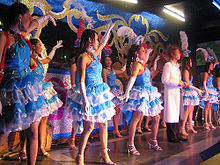Luk Thung

Luk Thung ( Thai ลูกทุ่ง , "child of the field"), also Lukthung , is a popular style of folk music in Thailand . The expression is the short form of Pleng Luk Thung (Thai เพลง ลูกทุ่ง , "song of the child of the field").
Beginnings and development
The style of music developed in the 1930s and quickly spread, mostly through broadcasting. The texts deal with the problems of the common rural population. In the late 1960s, Pleng Luk Thung was the most widely played style of music on the radio. From the 1970s, TV programs with Luk Thung were increasingly broadcast and the first cassettes were recorded and published.
To become a well-known Luk Thung singer, it was imperative that he came from a rural area. Sayan Sanya , one of the most famous Luk Thung singers at the time , was a rice farmer from Suphanburi . Suraphol Sombatcharoen , Ploen Phromdaen , Chai Muangsing and Phaibun Butkhan came from similar backgrounds with similar background stories. Many of the most popular Luk Thung stars were from Suphanburi, including the successful singer Pumpuang Duangjan , the daughter of a rural wage laborer ; she adapted the style to Thai pop music. This danceable form is also called Electronic Luk Thung . When Pompuang died in 1992, many feared Luk Thung would die with her. The style survived and with the founding of a Luk Thung radio station in 1997, the style regained popularity.
Since the 1990s there have been many connections between Luk thung , Thai pop music and Mor Lam . Since then, love songs have also been performed with a soft voice as Luk Thung . One young singer who became famous with a hit in 2009 is Phai Phongsathon .
The influence of the Mor Lam style gave rise to the new direction Luk Thung Isaan , also called Luk Thung Prayuk . This style incorporates the faster rhythms of the Mor Lam style. Jintara Poonlarp is a megastar in this direction .
More Luk Thung singers
- Duangta Kongthong
- Buppha Saichon
- Mike Phiromphon
- Ponchai Soipet
- Samai Onwong
- Sunaree Ratchasima
- Monkaen Kaenkoon
- Tai Orathai
- Dao Bandon
literature
- Amporn Jirattikorn: Lukthung: Authenticity and Modernity in Thai Country Music. In: Asian Music, Vol. 37, No. 1, Winter – Spring 2006, pp. 24–50
- James Mitchell: Sorapet Pinyoo and the Status of “pleeng luuk tung”. In: Journal of Southeast Asian Studies, Vol. 40, No. 2, June 2009, pp. 295-321
Web links
Individual evidence
- ↑ a b c Pasuk Phongpaichit, Chris Baker : Thailand. Economy and Politics. Oxford University Press, 1997, p. 77.
